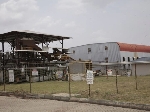Oil Palm Development Policy: Ensure smallholder farmers are fully integrated-GFL to gov't
 Abraham Koomson, General Secretary of GFL
Abraham Koomson, General Secretary of GFL
The Ghana Federation of Labour (GFL), an affiliate of the International Trade Union Confederation (ITUC), has called on the government to ensure that its newly announced National Integrated Oil Palm Development Policy (2026–2032) delivers concrete gains for workers, including job creation, fair wages, and improved working conditions.
The policy was introduced by the Minister for Finance, Dr. Cassiel Ato Forson, in the 2026 Budget Statement presented on Thursday, November 13, 2025.
It outlines plans to scale up plantation development, strengthen out-grower participation, and expand downstream processing and value addition within the oil palm industry.
Describing the policy as “a bold and strategic initiative,” Dr. Forson said it aims to transform Ghana’s oil palm sector—often referred to as the country’s “Red Gold”—into a major driver of industrialisation, rural development, and foreign exchange earnings.
He added that the framework draws on successful global models from Malaysia and Indonesia while adapting them to Ghana’s unique agricultural and economic context.
While welcoming the government’s renewed focus on the sector, the GFL urged policymakers to ensure that smallholder farmers are fully integrated into the value chain and that labour standards are upheld at every stage of implementation.
It also stressed the need for financing mechanisms that genuinely benefit producers rather than intermediaries.
The Federation further pointed to persistent land tenure challenges—particularly disputes involving stool and family lands—as a major constraint on investment and a cause of delays in large-scale agro-industrial ventures.
“We are of the firm view that oil palm remains a high-potential sector with the capacity to generate substantial employment across farming, milling, refining, packaging, and logistics,” the GFL said in a statement signed by its Secretary General, Mr Abraham Koomson.
The organisation emphasised that any industrial incentives under the new policy must translate into real jobs, stronger occupational safety systems, and meaningful social protection for workers.
It also called on both the government and the private sector to expand local recruitment, invest in skills training, adopt modern and safer workplace practices, and provide transparent reporting on job creation tied to policy incentives.
The GFL said effective implementation, strong institutional coordination, and continuous engagement with stakeholders will be critical to ensuring that the policy delivers tangible economic benefits and strengthens the livelihoods of workers across the oil palm value chain.
Source: Classfmonline.com/Cecil Mensah
Trending Business

GIPC CEO urges investors to capitalise on Ghana’s pro-business environment
01:40
TAGG attributes high prices of goods on the market to Customs taskforce bribery
14:31
Ghana generates US$9 billion in foreign exchange through ASM -Sammy Gyamfi reveals
12:52
S/R: PBC shea butter factory back up, contracts secured to supply Netherlands, others
12:16
We never valued Springfield’s asset at US$700 million- GNPC, Explorco reject allegations
06:37
Ghana welcomes rescission of Trump's 15% tariffs on cocoa, other agric products, and forecasts $60m in revenue boost
14:06
GUTA women's wing embarks on National Monitoring Tour to support traders
16:57
GTBank opens 38th branch in Ho, assures quality customer care and commitment to Volta Region’s economic growth
19:36
Blue Gold responds to Supreme Court ruling on Bogoso-Prestea mine case
08:22
President Mahama Appoints Kwame Griffiths as Deputy MD of Cocoa Processing Company
08:09




